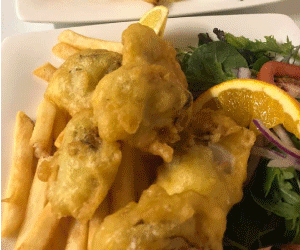Feedback sought on fisheries sustainability measures
09 December 2020, 3:50 PM

Fisheries New Zealand is seeking public feedback on proposed changes to catch limits and other measures across a range of fisheries as part of the April 2021 sustainability round.
The proposed changes released today (December 9) affect the giant spider crab fisheries (GSC 3, 5 & 6A), which are found at the Chatham Rise, South East Coast, Southland and Southern Offshore Islands. Any changes that alter the catch limits for giant spider crab will come into effect on 1 April 2021.
Proposed changes for rock lobster stocks are expected to be published on the Ministry for Primary Industries website by December 15.
Advertisement
Advertise on the Southland App
The consultation announced today will run for six weeks, with submissions closing on 5 February, 2021.
A summary of the proposal on the Ministry for Primary Industries website says giant spider crab in GSC 3, 5 and 6A are entirely taken as bycatch, mostly by large trawl vessels targeting squid.
"Observer data from the squid trawl fishery are strongly suggestive of an increase in giant spider abundance since the stocks were introduced to the [quota management system] in 2004. This suggests an opportunity for the [total allowable catch] and the [total allowable commercial catch] of these stocks to be sustainably increased," the summary says.
Advertisement
Advertise on the Southland App
Director Fisheries Management Emma Taylor says the consultation is part of Fisheries New Zealand’s twice-yearly regular reviews to ensure the ongoing sustainability of New Zealand’s fisheries resources.
“Our oceans and fisheries are important to all New Zealanders – they provide food for our whānau and jobs in our communities. It’s part of what makes this place home. By reviewing catch limits and other management measures, we help ensure their long-term sustainability for all New Zealanders to enjoy.
“We use the best available information to determine how fish stocks are faring and what course of action should be taken. If the information tells us that more fish can be sustainably caught, then we increase the catch limits. However, if the information shows the opposite, we look to reduce the catch limits.
“We also consider factors such as changes to the marine ecosystem that may affect sustainability, such as habitat degradation or pollution. An example of this is the proposed reduction to the commercial catch limits for flatfish and yellow-eyed mullet, which we consider would help avoid potentially negative effects to the ecosystem," Emma Taylor said.
The review announced today is in relation to the following stocks:
• Flatfish (FLA 2 – East Cape, Hawke’s Bay, Wellington and Taranaki)
• Giant spider crab (GSC 3, 5 & 6A – Chatham Rise, South East Coast, Southland and Southern Offshore Islands)
• Elephant fish (ELE 7 – West Coast and Top of the South Island)
• Giant stargazer (STA 1 – Waikato, East and West Coasts of Auckland and Northland, Bay of Plenty)
• Dark ghost shark (GSH 1 – East Coast of Northland and Auckland, Bay of Plenty)
• Yellow eyed mullet (YEM 9 - Waikato, West Coast of Auckland and Northland)
• Blue cod (BCO 4 – Chatham Islands)
Advertisement
Advertise on the Southland App
Four of these stocks (flatfish, stargazer, dark ghost shark and blue cod) are proposed to have their total catch limits and allowances set for the first time.
In addition to these proposed changes, a closure to the take of intertidal shellfish is proposed for Cockle Bay (Tuwakamana) in the Hauraki Gulf.
Any changes to elephant fish, flatfish, giant stargazer, dark ghost shark, or yellow-eyed mullet will come into effect on 1 October 2021. If implemented, the closure to shellfish take at Cockle Bay will commenced from 1 May 2021.
“Recent survey results for Cockle Bay suggests there are sustainability risks to the cockle populations, with declining numbers of large cockles. Closing the take of shellfish in the area will allow cockle populations to reach larger sizes and rebuild.
“People will always have strong views from across the spectrum - we need to hear these views so we can improve our proposals. We encourage everyone who has an interest in any of these fisheries being reviewed to put in a submission via our website," Emma Taylor said.
Find out more about the proposals and how to make a submission HERE.
ACTIVITIES & ATTRACTIONS




